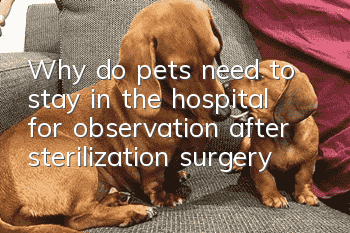Why do pets need to stay in the hospital for observation after sterilization surgery?

After a pet is sterilized, doctors generally do not allow the pet to be taken home immediately. Some may even recommend staying in the hospital for a few days for continued observation. Most pet owners think that everything will be fine once the pet anesthesia wears off. In fact, as the saying goes, 30% treatment and 70% care. Although a sterilization operation will disembowel your pet and damage your vitality, the quality of postoperative care affects the entire operation. Whether it was successful and whether the recovery period was smooth. Therefore, during the period of stay in the hospital for observation, the doctor was more attentive than during the operation!
The most unstable 3 hours after surgery
Three hours after surgery is the period of high incidence of surgical complications! Often, some hidden diseases of pets will occur at this time! This is why there are many rumors that a sterilization operation will kill a pet! In fact, sterilization surgery is a daily procedure. A doctor's most common surgical procedure rarely results in tragedy due to mistakes. On the other hand, pets suffering from hidden diseases (such as acute heart disease) that are not discovered by their owners may be fatal after surgery. Therefore, it is recommended to stay in the observation room for at least 3 hours to confirm that the patient is awake and stable before leaving the hospital. During the observation period, the anesthesiologist will also formulate a corresponding infusion plan based on the animal's condition and pain level, so the observation time will also be determined based on the infusion time. Severe cases are recommended to be hospitalized for observation.
Make sure to go through the dangerous stage before feeding
We have encountered some cases where owners brought their pets home, mistakenly thought they had passed the anesthesia when they woke up, and eagerly wanted to feed them some food to restore their strength. However, just after leaving the operating room, the animal is still in a state of awakening from anesthesia. Although it has basic reflexes, it has not fully recovered. Therefore, do not feed before fully awakening to prevent vomiting or reflux and possible esophageal erosive damage or aspiration pneumonia. The complete awakening time varies depending on the animal and the severity of its condition, and generally takes 8-10 hours; please contact us for special cases. It is at the discretion of the doctor.
Abnormal respiratory status is the most dangerous warning. After the doctor pushes the pet out of the operating room, the owner can accompany the pet throughout the process. At this time, the doctor will definitely have strict requirements on their "lying position": lying on their stomach or side. If the owner wants to hold the pet in his arms, he will definitely be opposed. In fact, the reason is very simple. Holding pets in your arms will affect their smooth breathing to a certain extent, and it is very likely that accidents such as suffocation may occur. Therefore, observing the respiratory status of pets after surgery is the most important reason to stay in the hospital for observation!
The pet’s stress state requires the owner’s patience and comfort
After surgery, pets can’t help but tremble, drool, moan, etc. This is the pet’s stress state. They are extremely fragile at this time. If you take them home at this time, the noise of vehicles on the road is likely to make them more sensitive and aggravate their stress response. Hospital observation periodDuring this time, the owner can relax the pet through soothing and whispering, so that they can feel the owner's company. Once this series of states disappear, the dangerous period will be over.
Keep warm! Keep warm!! Keep warm!!!
Once the pets are anesthetized, their body temperature will drop slightly, and they will still be in a hypothermic state after the operation. If the doctor finds that the pet is hypothermic after surgery, they will be placed in a constant temperature box to help recover. Before the pet is neutered, the owner can also prepare a thicker blanket for them and place it in the cage to reduce the shock when walking and to keep them warm! However, it should be noted that the pet will have a period of time after the operation. During the incontinence period, laying a layer of pet diapers on the blanket can prevent the blanket from getting dirty!
It is normal to feel irritable after surgery. Regardless of cats, dogs, male or female, they usually feel very irritable after waking up from anesthesia. This is a very normal phenomenon. The reason for irritability is the insecurity of not being able to control oneself and the side effects of pain. If the pet shows signs of scratching, biting, roaring, etc., the owner must first protect himself from being hurt, and then comfort the pet until it calms down. This is the same as the stress state mentioned before, which requires patience to alleviate.
Therefore, once your pet has undergone surgery, do not rush to take it home. It is a wise choice to leave enough time for observation in the hospital for a while. In addition, if the doctor thinks that the pet is too weak, or if other problems are found during the operation and need to be kept in the hospital for observation for a few days, the owner must cooperate! Although some sterilizers have figured out the routine of sterilization, there are still differences between different individuals. . If you listen to the doctor's advice more often, you can actually avoid 90% of the dangers.
- What should I do if my dog is picky about food? Don’t starve it!
- What is the average lifespan of an Australian Shepherd?
- Is it okay to postpone the dog’s vaccination for a few days?
- What kind of pet snacks should I choose? Freeze-dried snacks are a good choice!
- Dog hair loss is divided into physiological and pathological causes. Click here to see which type your dog belongs to?
- What is the best way to train an Anskimo dog? Anskimo dog training tips!
- How to remove dog odor from dogs and rooms? How to remove dog body odor!
- Is it really necessary to shave your pet’s hair in summer?
- Can the puppy not be fed on the first day after birth?
- What do you need to prepare before raising a dog? 10 essential basic equipment before a dog enters your home



